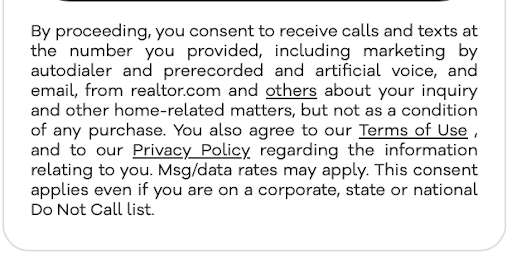 New consumer protection regulations from the Federal Communications Commission aims to protect consumers from the scams and spam caused by the “lead generator” robo-calls & texts loophole and encourages an opt-in approach for delivering email to text messages. The law extends the same do-not-call protections and CAN/SPAM to text messages, making it illegal to send text messages to numbers on the Do-Not-Call registry.
New consumer protection regulations from the Federal Communications Commission aims to protect consumers from the scams and spam caused by the “lead generator” robo-calls & texts loophole and encourages an opt-in approach for delivering email to text messages. The law extends the same do-not-call protections and CAN/SPAM to text messages, making it illegal to send text messages to numbers on the Do-Not-Call registry.
Real estate leads are among the most expensive leads generated across all American business, often leading to real estate professionals paying as high as 40% of their commission for a sale generated from a lead. Many leads generated at online shopping websites are sold over and over again, causing consumers to be inundated with spam-y text messages and robo-calls that seem to have no end. Now, there must be a clear opt-in by consumers to this form of communication. The FCC wants the consumer to opt in on a 1-to-1 basis to each company that will receive their contact information.
According to the FCC, U.S. Consumers receive approximately 4 billion robo-calls per month. In their enforcement efforts, the FCC has issued fines to some companies, like a Texas-based health insurance company whom I am not naming, of $255 million. A Florida-based timeshare operation was fined $120 million. The FCC also adopted new rules to stop illegal robo-calls that originate overseas from entering American phone networks.
U.S. Federal Communications Commission moved to make AI-generated voices in robocalls illegal on 8 February.
Real Estate Impact
Firms should update their agent independent contractor agreements. Real estate agents routinely use robo-call/robo-text services for lead generation and lead incubation. If the firm provides an agent with lead information that is added to a robo-call/robo-text service, there could be significant liability to the firm.
Many brokerage firms also share consumer information with their affiliated services companies. For example, a lead generated on a broker’s website gets shared with a brokers’ mortgage or insurance affiliate who also uses similar robo-call/robo-text systems for lead incubation. Agreements should be updated to prevent violations by these third-parties from blowing back on the real estate firm. Moreover, the consumer will need to opt-in to each service (i.e. checkbox for mortgage, title, insurance, etc.)
When you collect consumer information on a lead form or elsewhere, you likely need to update your terms of use to explicitly require a consumer opt-in to text messaging.
Examples of opt-in language from portal sites.

Figure 1 Realtor.com

Figure 2 From Zillow.com
From our reading of the FCC rulings, these sites would need to specifically say that they are going to send my information to Agent Name, Firm Name, Mortgage Company, and so on, and the consumer needs to check the box to agree.
Most of the portals send consumers to their in-house call center before they send it to an agent, so there may be a loophole where the call center gets permission from the consumer at the point of transfer.
Greg Robertson and Rob Hahn did a great podcast on this with Matthew Marx of Evocalize. Click here to watch.

Not to debate Rob – he is a very strong debater – but his view is: “calling expired listings will not be a problem with this new FCC rule.” I would suggest that it could be a problem if the consumer is on the Do-Not-Call list. Rob would likely agree with me.
Existing clients of the firm or prior lead gen records may be excluded from the FCC ruling.
The FCC is still processing the outline of their policies, so there are many unanswered questions. In the aforementioned “Industry Relations” podcast, they believe that the FCC will go after the lead generators and not the robo-dialers/texters, but there is no certainty there. I guess if you buy leads, you need to CYA to make sure that it does not blow back on you as an FCC violation.





Great insight on what’s coming and how we can prepare.